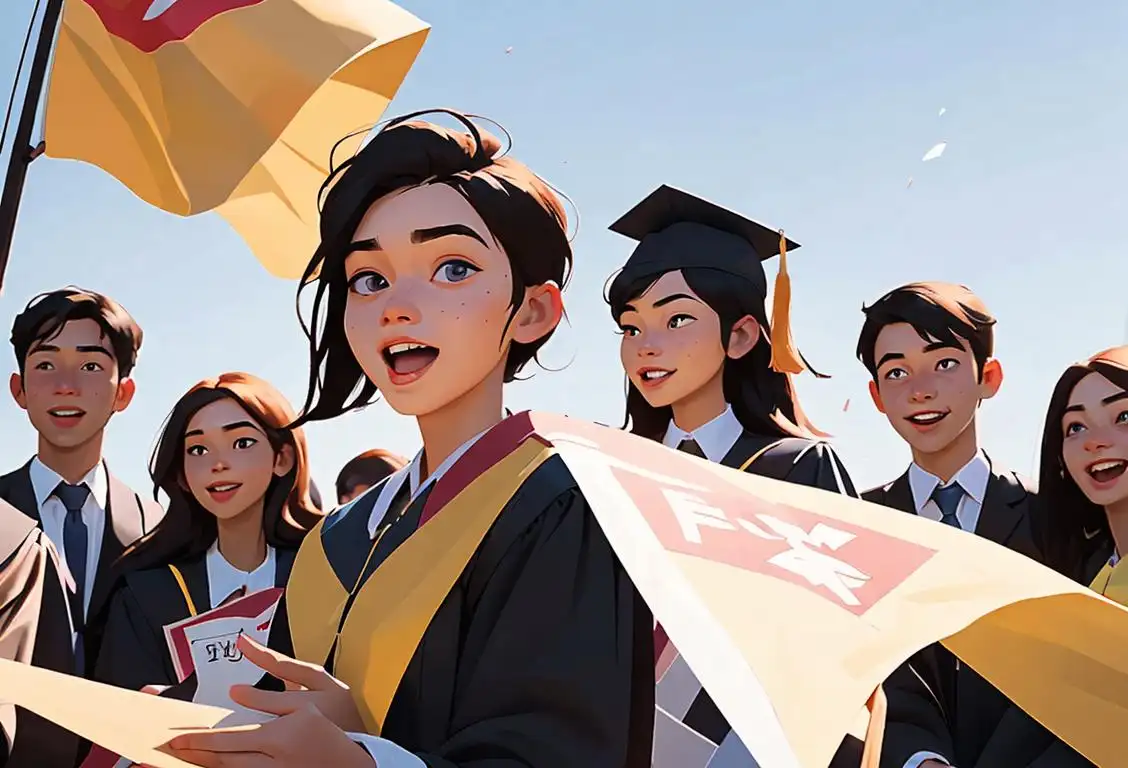National First Generation College Celebration Day

Welcome to the delightful celebration of National First Generation College Celebration Day! It's a day to honor and appreciate all those who blazed the trail and became the first in their families to pursue higher education. Let's dive into the remarkable history behind this special day.
When is First Generation College Celebration Day?
It's national first generation college celebration day on the 8th November.
Origin and Purpose
National First Generation College Celebration Day was established to recognize the triumphs and challenges of students who are the first in their families to attend college. It serves as a means to highlight their accomplishments and to promote access and support for first-generation college students.
Achieving the Impossible
For many first-generation students, pursuing higher education can be an uphill battle. They often face financial obstacles, lack of guidance, and familial responsibilities. Despite these challenges, they persevere and forge a path to success.
This day encourages educational institutions, students, and communities to come together, uplift, and celebrate these individuals for breaking barriers and achieving the seemingly impossible.
A Community Effort
National First Generation College Celebration Day is a collective effort that involves universities, colleges, non-profit organizations, and communities around the country. These institutions organize events, workshops, and informational sessions to provide support and resources to first-generation students.
It's a day to bring awareness to the unique needs of these students and foster a sense of belonging within the academic community.
History behind the term 'First Generation College Celebration'
1965
The Birth of Access Programs
In 1965, as part of President Lyndon B. Johnson's War on Poverty, the Higher Education Act was signed into law. This marked the start of federal policies aimed at expanding access to higher education for students from disadvantaged backgrounds. The act included provisions to establish programs such as Upward Bound, Talent Search, and Student Support Services, which targeted low-income students, first-generation college students, and students with disabilities.
1965
The Birth of the Higher Education Act
In 1965, the United States government passed the Higher Education Act, which aimed to strengthen colleges and universities and to make higher education more accessible to a wider range of Americans. This act provided financial aid to students from low-income families, opening up opportunities for many who would not have otherwise been able to attend college.
1944
The G.I. Bill
In 1944, the United States Congress passed the Servicemen's Readjustment Act, commonly known as the G.I. Bill. This bill provided a range of benefits to World War II veterans, including financial support for higher education. The G.I. Bill aimed to help veterans transition back into civilian life and improve their opportunities for success. This historic legislation paved the way for many first-generation college students who utilized the educational benefits to pursue higher education.
1849
The Creation of The First Public College
In 1849, the University of Iowa became the first public college to be established in the state. This significant event marked the beginning of the public higher education system in Iowa and paved the way for future developments in the field of education.
1963
Expansion of Higher Education
With the passage of the Higher Education Act of 1963, the United States made a committed effort to expand and diversify its higher education system. The act established various programs and financial aid options to make college more accessible to individuals from low-income backgrounds.
1970
The Emergence of First-Generation Identity
By the 1970s, the term 'first-generation college student' started gaining recognition and significance within the education community. College campuses began using the term to describe students whose parents had not attended college. This recognition of first-generation status represented a shift in understanding the unique challenges faced by these students, as they navigated unfamiliar territory in pursuit of higher education.
1979
Redefining Educational Goals
A major turning point came in 1979 when sociologist Robert L. Crain introduced the concept of first-generation college students. These students were the first in their families to attend college, breaking a cycle of limited educational opportunities. Crain's work emphasized the challenges and unique experiences faced by these students.
1862
The Morrill Act and Land-Grant Institutions
In 1862, the Morrill Act was passed by the United States Congress, granting federal lands to states for the establishment of colleges focused on agricultural and mechanical arts. This act played a crucial role in expanding access to higher education, as it led to the creation of land-grant institutions across the country. These colleges sought to provide practical skills and education to a broader range of students, including those who were not traditionally involved in higher education.
1965
The Higher Education Act
In 1965, the United States Congress passed the Higher Education Act as part of President Lyndon B. Johnson's Great Society initiatives. The act aimed to expand access to higher education by providing grants, loans, and work-study opportunities to students from low-income families. This legislation was a significant step in making college education more accessible to first-generation students, who often faced financial barriers.
1972
The Launch of the TRIO Programs
In 1972, the United States Department of Education introduced the TRIO Programs as part of the Higher Education Act. TRIO Programs are a set of federal outreach and student services programs designed to assist individuals from disadvantaged backgrounds, including first-generation college students. These programs offer counseling, tutoring, mentoring, and other support services to help students succeed in their academic pursuits.
1980s
Growing Awareness
As awareness about the experiences and needs of first-generation students grew, universities and colleges across the United States began implementing programs and support services specifically tailored to this student population. These initiatives aimed to address the unique challenges faced by first-generation students and provide them with the necessary resources to succeed.
1980
The Emergence of First-Generation College Students
During the 1980s, the term 'first-generation college student' started gaining recognition. It refers to individuals who are the first in their families to attend college. As colleges and universities became more diverse and accessible, the number of first-generation college students increased, leading to the need for additional support and celebration of their achievements.
1944
The G.I. Bill and Access to Education
The Servicemen's Readjustment Act of 1944, commonly known as the G.I. Bill, was signed into law to provide benefits to returning World War II veterans. One of the key benefits offered by the G.I. Bill was funding for education, which allowed many veterans to pursue college degrees. This legislation had a profound impact on increasing access to higher education and contributed to the growth of the first generation college student population.
1980
Supportive Programs and Services
Throughout the 1980s, colleges and universities began developing programs and support services specifically tailored for first-generation college students. These initiatives aimed to provide academic, financial, and social support to help these students successfully transition into and through college. Programs like mentoring, tutoring, and orientation workshops became essential components of the support system for first-generation students.
1968
The Civil Rights Act
The Civil Rights Act of 1968, also known as the Fair Housing Act, prohibited housing discrimination based on race, color, religion, and national origin. This legislation was a crucial milestone in breaking down racial barriers and reducing systemic inequalities. It provided opportunities for first-generation college students from marginalized communities to pursue education without facing discriminatory practices that limited their housing options near colleges and universities.
1980
The Triton College's First Generation College Celebration
In 1980, Triton College in River Grove, Illinois, celebrated the first-ever First Generation College Celebration. This event aimed to recognize and honor the achievements of students who were the first in their families to attend college. The celebration highlighted the importance of supporting and empowering first-generation students and encouraged others to pursue higher education despite potential challenges.
2015
Establishment of the First Generation College Celebration
In 2015, the Council for Opportunity in Education (COE) initiated the First Generation College Celebration. COE is a nonprofit organization that advocates for equal access to higher education for all students. The celebration, held annually on November 8th, aims to recognize and celebrate the accomplishments of first-generation college students. It also serves as an opportunity to raise awareness about the challenges these students face and to provide support and resources for their success.
2008
First-Generation College Celebration Established
In 2008, the Council for Opportunity in Education (COE), a nonprofit organization dedicated to expanding college opportunities for low-income students, officially designated the week of November 8th as the First-Generation College Celebration. This celebration aims to recognize the achievements and experiences of first-generation college students, while also raising awareness of the barriers they often face. Each year, colleges and universities across the United States organize events and activities to honor and support first-generation students.
2011
Inaugural First-Generation College Celebration
In 2011, the Council for Opportunity in Education (COE) established the annual First-Generation College Celebration. This celebration aims to recognize and honor the achievements of first-generation college students, faculty, and staff. It also serves as a platform to raise awareness about the challenges faced by this demographic and the importance of supporting their educational journey.
1965
The Higher Education Act
In 1965, the Higher Education Act was signed into law, aiming to support students from disadvantaged backgrounds in accessing and succeeding in higher education. The act established Federal TRIO Programs, which provided resources and support services to low-income, first-generation college students, among others. The recognition of the unique challenges faced by first-generation students marked an important step in fostering their success in higher education.
2017
Inaugural First-Generation College Celebration
In 2017, the Council for Opportunity in Education (COE), in collaboration with other educational institutions and organizations, launched the inaugural First-Generation College Celebration. This yearly event, held on November 8th, aimed to honor and support first-generation college students, graduates, and their allies. It provided a platform for celebrating the achievements and experiences of first-generation students while raising awareness about the challenges they face.
2017
First-Generation College Celebration Goes National
In 2017, through a bipartisan resolution, the United States Congress officially recognized November 8th as the National First-Generation College Celebration Day. This national recognition further highlighted the importance of supporting and promoting educational opportunities for first-generation college students. It encouraged educational institutions, organizations, and communities to celebrate the accomplishments of these students and to continue advocating for their success.
Present
Continued Advocacy and Support
Since the inaugural celebration, the First-Generation College Celebration has gained national and international recognition. Colleges and universities around the world organize events, workshops, and activities to promote the success and empowerment of first-generation college students. The celebration serves as a reminder of the progress made in supporting first-generation students, while also highlighting the ongoing work needed to ensure equity in higher education.
Present
Continued Recognition and Support
The First Generation College Celebration has grown since its establishment in 2015. Many colleges, universities, and educational organizations across the United States now participate in this annual event. The celebration involves various activities such as panel discussions, workshops, and social gatherings to honor the achievements of first-generation college students and to foster a supportive community for them on campus. It continues to bring attention to the importance of higher education accessibility and the unique experiences of first-generation college students.
2017
National First Generation College Celebration
In 2017, the Council for Opportunity in Education (COE) and the Center for First-Generation Student Success, in collaboration with various institutions and organizations, designated November 8th as the National First Generation College Celebration. This day serves as an annual opportunity to celebrate and support first-generation college students, raise awareness about their varying needs, and acknowledge the significant contributions they make to their communities and the nation as a whole.
Did you know?
Did you know that the number of first-generation college students has been steadily increasing over the years? They are trailblazers paving the way towards a brighter future for their families and communities.Tagged
awareness fun educationFirst identified
6th November 2019Most mentioned on
8th November 2019Total mentions
19Other days
School Nurse Day
Mathematics Day
Punctuation Day
Grammar Day
History Day
Student Athlete Day
Bird Day
Education Day
Teacher Appreciation Day
Puzzle Day









